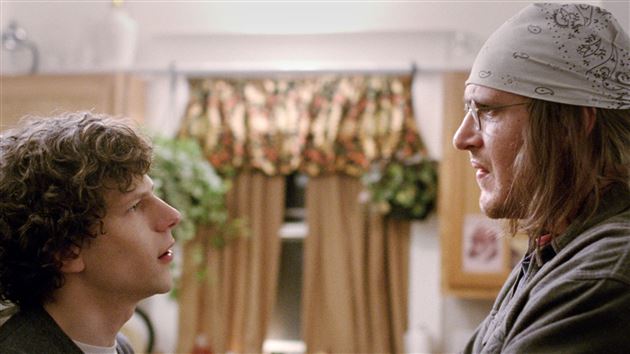
The brilliantly witty and insightful road trip movie The End of the Tour isn’t great because of what happens on the road – it’s great because we drill into two fascinating characters and see how their relationship evolves (or doesn’t evolve). Leads Jason Segel and Jesse Eisenberg are both Oscar-worthy, and The End of the Tour is on my Best Movies of 2015 – So Far.
In 1996, David Lipsky (Jesse Eisenberg) is a novelist of modest success, having deeply embraced the New York City writer’s scene, and is supporting himself as a journalist for Rolling Stone Magazine. Suddenly- and out of nowhere – David Foster Wallace (Jason Segel) explodes on the scene with his masterpiece Infinite Jest and is immediately recognized as a literary genius. Lipsky is confounded by Wallace’s meteoric rise – and jealous and resentful, too.
Lipsky arranges to accompany Wallace on the last few stops of his book tour and record their conversations, so Lipsky can write a profile of Wallace for Rolling Stone. It’s clear that Lipsky plans to write a sensationalistic celebrity take down – and Wallace is so odd that there’s plenty of ammunition.
All of this REALLY HAPPENED. Years later, after Wallace’s death, Lipsky wrote a memoir of the encounters, on which the movie is based. Eisenberg and Segel got to listen to the tapes of the actual conversations between the two.
The End of the Tour is a battle of wits between two very smart but contrasting guys. Wallace is new to fame, very personally awkward, not at all confident and gloriously goofy; he seems to be an innocent, but he’s VERY smart and not entirely naive. Lipsky is all Chip On the Shoulder as he probes for Wallace’s weaknesses. As different as they are, the two are competitive and snap back and forth, verbally jousting for the entire trip. At one point, Lipsky accuses Wallace of pretending to be not as smart as he is as a “social strategy”.
As funny as is their repartee, it becomes clear that Wallace is inwardly troubled, and clinging to functionality by his fingernails. Wallace gets more confident and begins to trust Lipsky, but Lipsky is still predatory, glimpsing into Wallace’s medicine cabinet and chatting up an old flame of Wallace’s. Still, the intimacy of a road trip forces them to share experiences, which COULD become the basis for a bond.
They even share moments of friendship. But will they become friends? Is there real reciprocity between them?
Who has the power here? Wallace has the power of celebrity, and dominates Lipsky’s chosen vocation. Lipsky has the power to destroy and humiliate Wallace. Ultimately, as we see in the movie, the person who NEEDS the most will cede the power in the relationship.
Director James Ponsoldt has succeeded in making a brilliantly entertaining drama about two smart guys talking. There’s never a slow moment. We’re constantly wondering what is gonna happen. Ponsoldt has already made two movies that I love – Smashed and The Spectacular Now. No one else has made conversation so compelling since the My Dinner with Andre, and The End of the Tour is much more accessible and fun than that 80s art house hit.
Ponsoldt fills the movie with sublime moments. In one scene, we see the two watching a movie with two female companions. In the darkened theater, two characters are focused on the screen and two are gazing at others. It’s a shot of a couple of seconds, nothing happens, and there’s no dialogue – but the moment is almost a short story in and of itself.
For a true-life drama, The End of the Tour is very funny. The humor stems from situations (the two rhapsodize on Alanis Morisette, of all people), behavior (Wallace’s peculiarities and Lipsky’s limitless snoopiness) and the very witty dialogue. There’s a classic moment when Lipsky has Wallace talk on the phone to Lipsky’s wife (Anna Chlumsky) and is very uncomfortable with the results.
What is the funniest line in the movie? Who wins the battle of wits? And what’s their relationship at the end? Those questions propel the audience along the smartest road trip movie ever – The End of the Tour. It’s available streaming from Amazon Instant, Vudu, YouTube and Google Play.
